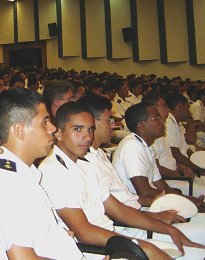
Reportage
UNAIDS and partners reach out to young military recruits in Brazil
27 février 2006
27 février 200627 février 2006

Packed with 750 young navy cadets, the Rio de Janeiro’s Naval School hosted representatives from the Brazilian Ministries of Defense and Health, UNAIDS and UNFPA to launch the STD, HIV and AIDS Prevention Programme in the Armed Forces and Military Academies.
Conceived as a follow-up to the 2004 Agreement between UNAIDS and the Brazilian Government to strengthen prevention among the country’s conscripts, the project aims to enhance military capacity to plan, monitor and evaluate prevention activities.
The programme will also integrate HIV prevention in military schools curricula and Armed Forces training courses. “There is a correlation between low education, low information and HIV. Those who have more access to information are better protected” said Admiral Carlos Edson Martins da Silva, Coordinator of the Programme in the Brazilian Ministry of Defense.
With more than 310,000 personnel stretched across the country, the Armed Forces are a key actor in Brazil’s HIV prevention. Brazil’s well structured health services are available not only to military personnel, but also to civilians in remote regions otherwise without access to public health services. Brazilian Government also produces generic antiretroviral drugs that are available to the population at reduced prices.
New course materials include a training guide and a peer education toolkit, and are specifically adapted to the Brazilian setting. “Providing information alone is not enough. We need to change attitudes and you will be the agents of this change”, Dr. Andrea Boccardi, UNAIDS Latin America Regional Advisor for AIDS, Security and Humanitarian Response addressed the navy aspirants attending the launching ceremony.
HIV prevention efforts in Brazil’s Armed Forces date back to the 90’s. The research carried out between 1996 and 2000 by Brazilian Ministry of Health shows a consistent increase in the use of condoms among young conscripts, from 38% in 1997 to 50% in 2000.
For more information, please contact Naiara G. da Costa Chaves (UNAIDS - Brasil) naiara@undp.org.br

